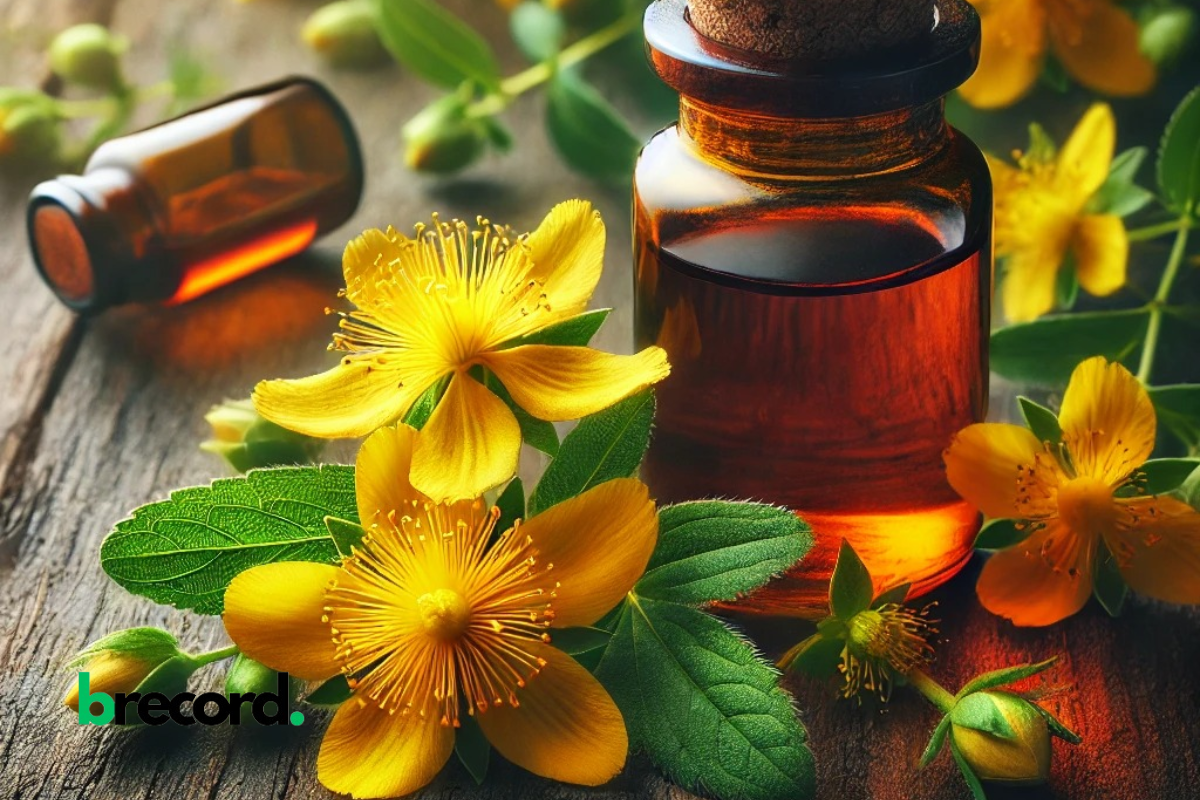St. John’s Wort, a flowering plant traditionally used for its medicinal properties, has grown in popularity for its potential mental health benefits, particularly as a natural treatment for mild to moderate depression. Extracted from the yellow flowers of Hypericum perforatum, St. John’s Wort contains active compounds believed to support mood, mental health, and overall wellness. This guide explores everything you need to know about St. John’s Wort extract, from its historical uses and health benefits to recommended dosages, potential side effects, and safety tips.
What is St. John’s Wort Extract?
St. John’s Wort, scientifically known as Hypericum perforatum, is a perennial herb native to Europe but now found in many parts of the world. The extract is derived from the plant’s flowers and contains several bioactive compounds, including hypericin, hyperforin, and flavonoids, which contribute to its therapeutic effects. The plant has been used for centuries in traditional medicine, where it was believed to help heal wounds, treat nerve pain, and lift mood.
Today, St. John’s Wort extract is widely available as a supplement in various forms, including capsules, tablets, liquid extracts, and teas. It’s most commonly used to support mental health and mood, but it also has anti-inflammatory, antibacterial, and antioxidant properties.
Active Compounds in St. John’s Wort Extract
St. John’s Wort extract’s effects are largely attributed to two main active compounds:
- Hypericin: This compound is thought to influence serotonin, dopamine, and norepinephrine levels, contributing to mood balance.
- Hyperforin: Hyperforin is believed to play a significant role in regulating neurotransmitters, which can positively impact mood and mental health.
These compounds work together to provide a range of benefits, particularly for mental well-being.
Health Benefits of St. John’s Wort Extract
1. Supports Mood and Mental Health
St. John’s Wort is most commonly used for its mood-boosting properties. Research indicates that it may help alleviate symptoms of mild to moderate depression by increasing levels of neurotransmitters in the brain, similar to how some antidepressant medications work. Many studies have shown that St. John’s Wort can be effective for managing mood in cases of mild to moderate depression, although it’s not generally recommended for severe depression.
2. Relieves Symptoms of Anxiety
Some people find St. John’s Wort helpful in managing mild anxiety symptoms. Its potential to regulate neurotransmitters, particularly serotonin, may contribute to an overall sense of calm and relaxation. However, more research is needed to fully understand its efficacy in treating anxiety disorders.
3. Promotes Wound Healing
St. John’s Wort has anti-inflammatory and antibacterial properties, which may aid in wound healing. Traditionally, the herb was applied topically to treat cuts, burns, and bruises. Today, St. John’s Wort-infused oils and ointments are still used to support skin health and promote healing for minor wounds and skin irritations.
4. Eases Symptoms of PMS and Menopause
For women, St. John’s Wort may help alleviate certain symptoms associated with premenstrual syndrome (PMS) and menopause. Some studies suggest it can reduce mood swings, irritability, and other symptoms related to hormonal changes.
5. Anti-Inflammatory and Antioxidant Properties
St. John’s Wort extract has antioxidant properties that help protect cells from damage caused by free radicals. It also has anti-inflammatory effects, which may be beneficial for conditions involving inflammation, such as arthritis. While this use is less common, these properties make it a valuable natural remedy for overall wellness.
How to Use St. John’s Wort Extract
Qherb herbal extract St. John’s Wort extract is available in various forms, each with specific uses and benefits:
- Capsules and Tablets: These are the most common forms of St. John’s Wort supplements, typically standardized to contain a specific amount of hypericin or hyperforin. Capsules and tablets are convenient for daily use and provide a consistent dosage.
- Liquid Extracts and Tinctures: Liquid extracts are fast-acting and easy to adjust in terms of dosage. Tinctures can be added to water or juice and are especially helpful for those who may have difficulty swallowing capsules.
- St. John’s Wort Tea: Dried St. John’s Wort leaves can be brewed into tea for a mild, relaxing beverage. However, tea may not provide a consistent dosage, as the concentration of active compounds can vary.
- Topical Ointments and Oils: For skin applications, St. John’s Wort oil or ointment can be applied directly to minor cuts, burns, or other skin irritations. This form allows for targeted use and is ideal for those seeking its skin-healing benefits.
Recommended Dosage for St. John’s Wort Extract
The appropriate dosage of St. John’s Wort extract depends on factors like the form of the extract, the specific concentration of active compounds, and individual health needs. However, here are general guidelines:
- For Mild Depression and Mood Support: The typical dose for mild to moderate depression is around 300 mg, taken two to three times daily. Look for products standardized to contain 0.3% hypericin or 3-5% hyperforin for the best results.
- For Anxiety: For anxiety relief, dosages are similar to those for depression, though it’s essential to consult with a healthcare professional before starting.
- Topical Use: Apply a small amount of St. John’s Wort oil or ointment to the affected area as needed.
Always follow the dosage instructions on the product label, and consult with a healthcare professional to find the best dosage for your needs, especially if you’re taking other medications.
Potential Side Effects and Precautions
While St. John’s Wort is generally safe for most people, it can cause side effects and interact with certain medications. Here are some potential side effects and precautions:
1. Photosensitivity
St. John’s Wort may increase sensitivity to sunlight, particularly in fair-skinned individuals. This can lead to an increased risk of sunburn or skin rash. If you’re taking St. John’s Wort, avoid prolonged sun exposure and use sunscreen to protect your skin.
2. Gastrointestinal Upset
Some people experience mild digestive issues, such as nausea, diarrhea, or bloating when taking St. John’s Wort. These symptoms are usually mild and may decrease with continued use.
3. Interference with Medications
St. John’s Wort is known to interact with a wide range of medications. It can affect the efficacy of birth control pills, antidepressants, blood thinners, and immunosuppressants, among others. Always check with a healthcare provider before combining St. John’s Wort with other medications.
4. Mood Changes and Agitation
In rare cases, St. John’s Wort may cause mood swings, anxiety, or agitation. If you experience any severe mood changes or other unusual symptoms, discontinue use and consult a healthcare professional.
Who Should Avoid St. John’s Wort?
St. John’s Wort is not suitable for everyone. The following groups should avoid it or consult a healthcare provider before using it:
- Pregnant or breastfeeding women: St. John’s Wort has not been thoroughly studied for safety in these groups.
- People with bipolar disorder: St. John’s Wort can potentially trigger mania in individuals with bipolar disorder.
- Those on prescription medications: If you’re taking any medication, particularly antidepressants, birth control, or blood thinners, consult your healthcare provider before using St. John’s Wort.
Choosing a Quality St. John’s Wort Extract
Not all St. John’s Wort supplements are created equal, so it’s essential to choose a high-quality product. Here are a few tips:
- Standardization: Look for products standardized to contain a specific amount of hypericin or hyperforin, as these are the active compounds responsible for its therapeutic effects.
- Reputable Brand: Choose a brand with good manufacturing practices (GMP) and third-party testing to ensure quality and safety.
- Organic and Non-GMO: For those concerned about pesticides or GMOs, organic and non-GMO certified St. John’s Wort supplements are available.
Conclusion
St. John’s Wort extract offers a natural, plant-based option for those seeking to support their mental health, skin healing, and overall wellness. Its active compounds, particularly hypericin and hyperforin, provide unique mood-boosting properties that can make it a valuable addition to a wellness routine. However, St. John’s Wort should be used with caution, especially for those taking prescription medications, due to its potential for interaction.
With proper dosage, quality selection, and guidance from a healthcare professional, St. John’s Wort extract can be a safe and effective option for those looking to embrace natural wellness. Whether you’re dealing with mild mood issues, skin concerns, or are simply curious about herbal supplements, St. John’s Wort offers a time-tested, nature-inspired approach to health.
Check out our blog for more interesting reads.



